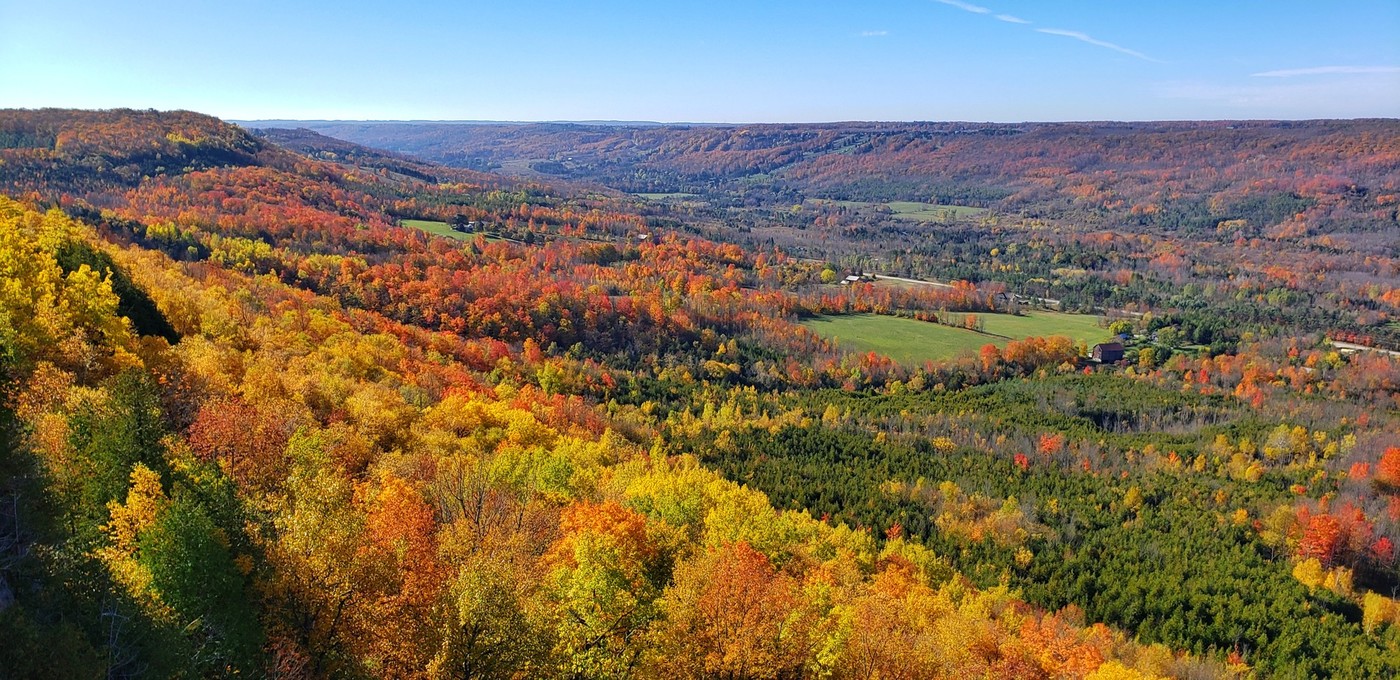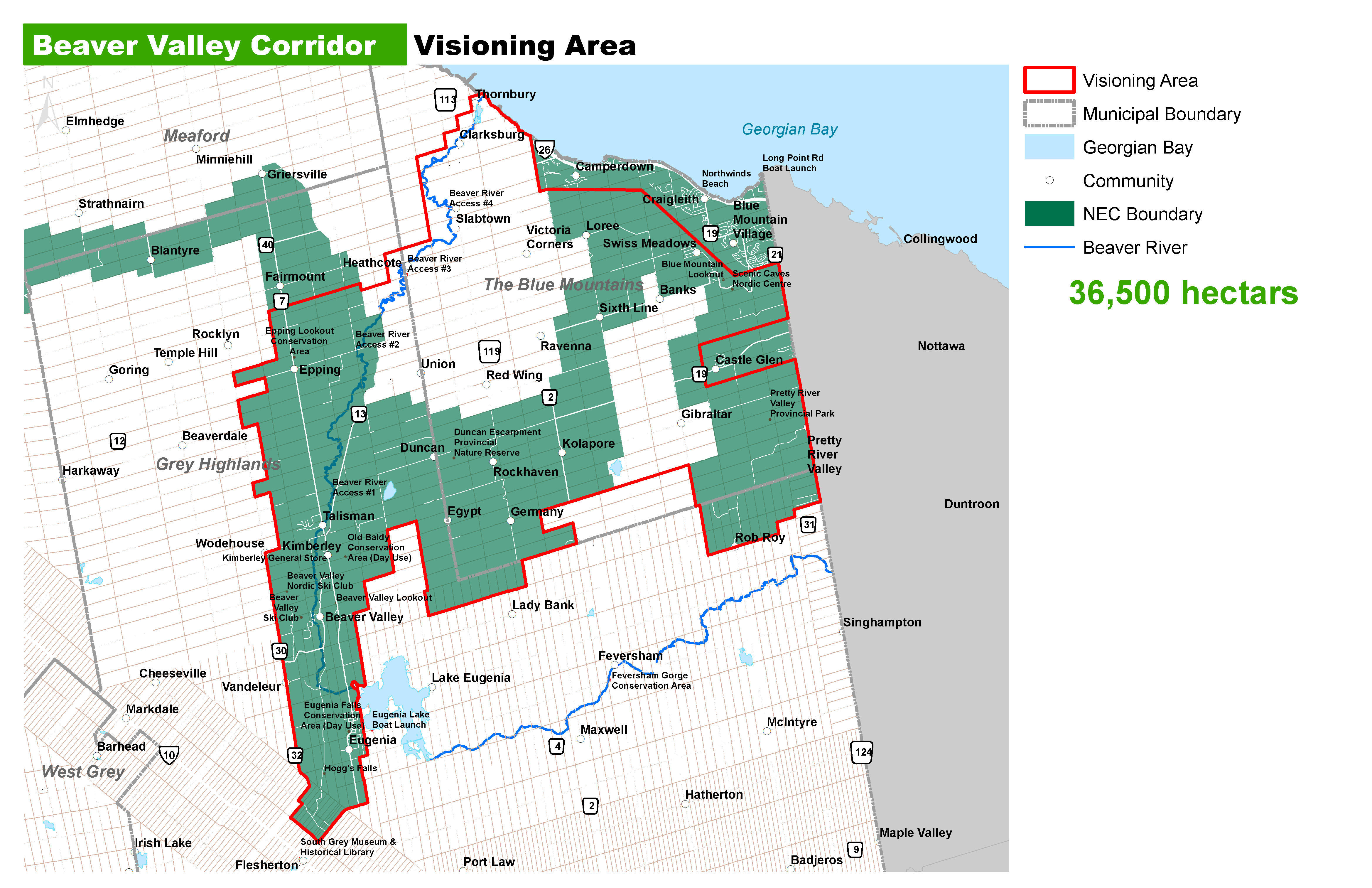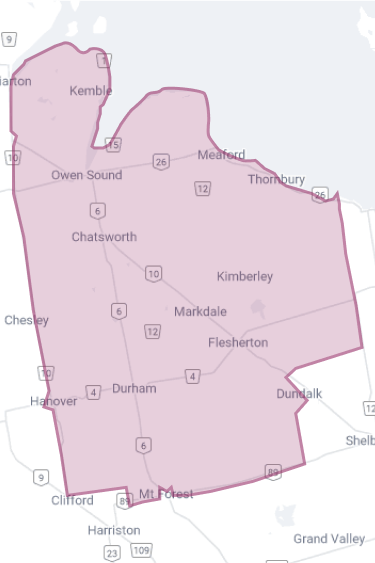Beaver Valley Sustainable Tourism Strategy
Grey County, Grey Highlands, the Town of The Blue Mountains and RT07 have developed the first sustainable tourism strategy and three-year action plan for the Beaver Valley Corridor.

— Draft Beaver Valley Sustainable Tourism Strategy
Grey County has worked with partners to develop the first sustainable tourism strategy and three-year action plan for the Beaver Valley Corridor. This corridor runs north from the village of Flesherton through the Niagara Escarpment, through the communities of Kimberley and Eugenia to the town of Thornbury.
Grey County is a renowned four-season tourism destination. The popularity of our region is growing year over year as visitors discover our beautiful scenery and unique offerings, but visitor amenities and tourism infrastructure are limited. The Beaver Valley is a cherished corridor within the County and it is important to our communities that this region is respectfully enjoyed. It’s also important to understand the value the Beaver Valley holds. Project partners recognize the need to frame tourism development and management in a way that balances the economic, social/cultural, and environmental needs and opportunities for tourism, while responding to and recognizing visitor needs.
The Beaver Valley Sustainable Tourism Strategy was supported by Grey County Council on October 26, 2024 and the Municipality of Grey Highlands and the Town of The Blue Mountains at meetings in November.
Strategy Recommendations
The strategy has been developed over several months and following robust engagement with partners, landowners, community members, interest groups and service clubs in and connected to the Beaver Valley corridor.
This strategy is all about balance. There are only two strategic opportunities for a reason. Both sides are equally important and will take incredible attention and resources to achieve. Project partners understand that our sphere of control is limited, so the opportunities and goals are meant to focus on our roles and responsibilities, while also leaning on others who will play an important role in collectively realizing the shared vision.
- Partner alignment and collaboration
- Tourism development
|
Opportunity |
Goals |
Objectives |
|---|---|---|
|
Partner Alignment & Collaboration |
Destination stakeholders are working efficiently and effectively together to shape and deliver tourism sustainably. |
- To grow and unite destination stakeholders into a tourism community. - To align efforts to improve Beaver Valley as a destination. |
|
Tourism Development |
Tourism assets and infrastructure are being responsibly and successfully used to attract visitors to the Beaver Valley. |
- To leverage and grow demand generators. - To lay the groundwork for tourism investments that will bring long-term benefits. |
Strategy Objectives
The Beaver Valley Sustainable Tourism Strategy and supporting action plan was developed to address the following objectives:
- Understanding the background and context surrounding tourism in the Beaver Valley Corridor.
- Gathering insight, input, and feedback from a diversity of stakeholders.
- Identifying strengths, weaknesses, opportunities, and challenges for tourism in the Beaver Valley.
- Co-creating a sustainable tourism strategy with a long-term vision for the Beaver Valley Corridor and confirming actions for the coming years.
- Establishing a clear understanding of the roles, responsibilities, and resources needed to implement an action plan.
Strategy Process
Several factors inform the need and timeliness for this project, including considerable growth in recent years, planned re-development of significant properties in the Beaver Valley, and infrastructure and space constraints. These factors require action to mitigate negative visitor impacts and resident conflicts.
The project involves four phases. We are currently wrapping up Phase 2.
Phase 1: Project Initiation, Management, and Communications (complete)
Phase 2: Research and Engagement Planning (complete)
Phase 3: Market Research and Landscape Assessment (complete)
Phase 4: Strategy Development and Implementation Planning (complete)
Several categories of stakeholders have engaged across the project. This includes, but is not limited to, visitor-facing businesses, residents from rural areas across the corridor, community groups, and tourism organizations and partners active in the area.
Strategy Endorsed By Partners
The Beaver Valley Sustainable Tourism Strategy has been supported by all four project partners, Grey County, the Municipality of Grey Highlands, The Town of The Blue Mountains and Regional Tourism Organization 7 (RTO7). Partners are working together to begin implementing the plan.
Partners
Grey County, the Municipality of Grey Highlands, the Town of The Blue Mountains, and Regional Tourism Organization 7: BruceGreySimcoe partnered and received funding from the Province of Ontario to develop the Beaver Valley Sustainable Tourism Strategy and three-year action plan.
The project partners engaged Bannikin to facilitate the research and strategy development process. Bannkin is a Canadian-based professional services company operating in the tourism space and specializing in strategy, development, and public relations. As part of their strategy and development work, Bannikin relies on community-based and participatory research to inform decision-making around capitalizing on tourism development and management opportunities.
Frequently Asked Questions
No. This strategy will consider a vision based on current zoning.
To co-develop a sustainable tourism strategy to envision the desired future state of the Beaver Valley Corridor along with a three-year action plan to initiate first steps.
- To understand the background and context surrounding tourism in the Beaver Valley corridor.
- To gather insight, input, and feedback from a breadth and diversity of stakeholders.
- To identify strengths, weaknesses, opportunities, and challenges for tourism in the Beaver Valley.
- To co-create a sustainable tourism strategy with long term vision for the Beaver Valley corridor and confirm what action to take in the next few years.
- To establish a clear understanding of the roles, responsibilities, and resources required for implementing the actions identified.
Biosphere reserves focus on balancing nature conservation with sustainable development for and with communities. They must fulfil three basic, equal and mutually complementary functions: conservation, development and logistical support (Niagara Escarpment Biosphere Network).
Several factors inform the need and timeliness for this project. Among these is significant visitor growth to the Beaver Valley in recent years, planned re-development of significant properties in the Beaver Valley, and infrastructure and space constraints and challenges across the corridor related to Municipal services and visitor volume. These factors, among others, require immediate action to mitigate negative visitor impacts and resident conflicts and strategically plan for the future, knowing the popularity of the Corridor is not going to reverse.
The below timeline provides date ranges for the key stakeholder-facing activities that make up the project. Please note that timelines may change as the project progresses and the team responds and adjusts to factors, such as events or stakeholder availability, that can impact the flow of activities. Currently the Tourism Community is open, and we invite your input, please see link in section above.
- Tourism Community Survey: March 20th - April 14th
- Table talks with select visitor-facing businesses: March 29th
- Interviews with select key informants: April
- Destination stewardship session with identified stakeholders: June, exact date TBC




